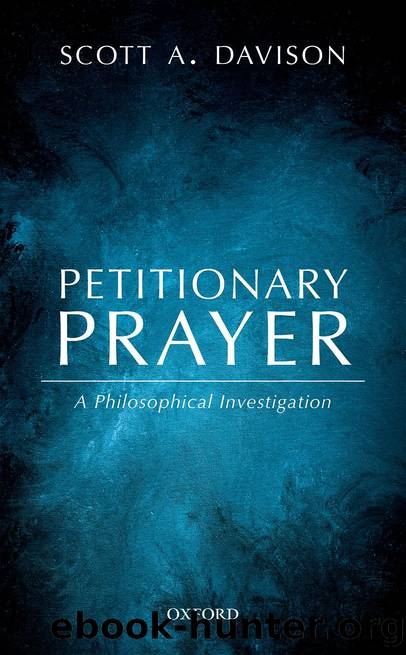Petitionary Prayer by Davison Scott A.;

Author:Davison, Scott A.; [Davison, Scott A.]
Language: eng
Format: epub
Publisher: Oxford University Press USA - OSO
Published: 2017-01-11T00:00:00+00:00
6
Divine Goodness and Praying for Others
6.1 Petitionary Prayer and the Problem of Evil
As noted in chapter 3, God is rational, and so must do what there is conclusive reason to do. Given the contrastive reasons account (CRA) of answered prayer defended in chapter 2, if God has conclusive reasons for doing something E independently of petitionary prayers offered for E, then Godâs bringing about E cannot be counted as an answer to those petitionary prayers. But what if there are cases in which God has less than conclusive reasons for doing something? Are those cases in which petitionary prayer could make all the difference?
Some traditional theists hold that Godâs moral perfection requires that God must always choose the best available course of action in any situation. But others disagree, claiming instead that God can choose less than the best available course of action, and yet remain perfectly good and loving. This is a large and complicated dispute about the available space among Godâs reasons, to use the language from chapter 1. It is a dispute that has generated a great deal of controversy, and I will not try to resolve it here.1 Instead, in this chapter I will confine myself to discussing challenges and defenses related to other, more specific claims concerning divine goodness and love.
Suppose that a person P suffers from an illness, that another person S offers petitionary prayers for Pâs recovery, and that God answers Sâs prayers by healing P. Would God have healed P even if nobody had prayed for this? Surely God knew about Pâs situation, and cared about P more than anyone else did, and knew that it would be good for P to be healed. (After all, if it were not good for P to be healed, then presumably God would not have answered Sâs prayer for this.2) But if God would have healed P even if nobody had prayed for this, then Sâs prayer made no difference, and hence was not answered after all.3 This kind of challenge has dominated many discussions of petitionary prayer in the literature, and the most important defenses formulated to date are designed to answer it. (In this chapter and the next two, we will discuss in detail the most prominent and promising defenses of petitionary prayer in the literature.)
Charles Taliaferro considers cases in which God does not provide something for someone because others have not offered petitionary prayers. He claims that such cases are no more (or less) problematic than cases in which adults fail to provide for children in their care:
Clearly this is all part of the problem of evil.â¦But if one believes it is possible for an all-good God to create a world where the well-being of children depends on others, it is not clear that petitionary prayer should create an additional problem.4
Download
This site does not store any files on its server. We only index and link to content provided by other sites. Please contact the content providers to delete copyright contents if any and email us, we'll remove relevant links or contents immediately.
What Is the Gospel? (Foreword by D. A. Carson) by Greg Gilbert(951)
Daily Strength: Devotions for Bible Believing Study by Douglas Stauffer & Andrew Ray & Rick Quatro(854)
Christian Ethics by Wilkens Steve;(765)
The Practice Is the Path by Tias Little(757)
New Morning Mercies by Tripp Paul David(755)
Jesus in Me by Anne Graham Lotz(715)
Veritas: A Harvard Professor, a Con Man and the Gospel of Jesus's Wife by Ariel Sabar(692)
Cleaning Up Your Mental Mess by Dr. Caroline Leaf(673)
Greatest Mystery in the World by Og Mandino(608)
The Creative Call by Janice Elsheimer(530)
No More Christian Nice Guy by Paul Coughlin(528)
Our Appointment with Life by Thich Nhat Hanh(526)
2084 by John C. Lennox(507)
Monastic Archaeology by Unknown(494)
This One Wild and Precious Life by Sarah Wilson(494)
Jesus--Awesome Power, Awesome Love (Discover 4 Yourself® Inductive Bible Studies for Kids) by Kay Arthur(492)
The Duties of Parents by J.C. Ryle(468)
The Tale of the Tardy Oxcart (Swindoll Leadership Library) by Swindoll Charles R(446)
A Closer Talk with God: Scriptural Prayers for Women by Kim Trujillo(434)
